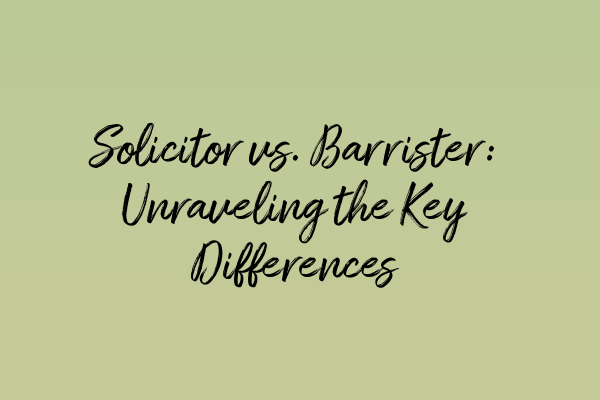Solicitor vs. Barrister: Unraveling the Key Differences
When it comes to the legal profession, the roles of solicitors and barristers often cause confusion for those outside the legal world. While these terms may be used interchangeably at times, solicitors and barristers are distinct legal professionals with different skill sets and responsibilities. In this article, we will delve into the key differences between solicitors and barristers, shedding light on their respective roles and functions within the legal system.
Solicitors: The Trusted Legal Advisors
Solicitors are the first point of contact for individuals seeking legal advice and assistance. They are legal professionals who provide a wide range of legal services to clients, including advice, representation, and drafting legal documents. Solicitors handle legal matters in a variety of areas, such as family law, civil law, criminal law, and commercial law.
One of the primary roles of a solicitor is to provide legal advice to their clients. They analyze the client’s situation, assess the legal implications, and offer guidance on the best course of action. Solicitors also represent clients in negotiations, mediations, and settlements. They have the expertise to draft legal documents, such as contracts and wills, ensuring they are legally compliant and meet the client’s needs.
A solicitor’s focus is on building relationships with clients and providing comprehensive legal services tailored to their specific needs. They work closely with their clients, keeping them informed throughout the legal process. Solicitors also play a crucial role in managing and preparing cases for court hearings, when necessary.
Barristers: Advocates in the Courtroom
Barristers, on the other hand, are specialists in advocacy and representing clients in court. They are independent legal professionals who are usually instructed by solicitors to provide expertise in complex legal matters. Barristers have in-depth knowledge of specific areas of law and excel in oral argumentation and legal analysis.
While solicitors handle the initial stages of a legal case, barristers are typically involved when the matter requires courtroom representation. Barristers review the evidence, research relevant case law, and provide expert advice regarding the prospects of success. They appear in court on behalf of their clients, presenting their case, examining witnesses, and delivering persuasive arguments.
The primary distinction between solicitors and barristers lies in their courtroom roles. Barristers are trained to be effective advocates, presenting legal arguments and cross-examining witnesses with precision and skill. Their focus is on the art of persuasion within the courtroom setting.
Collaboration between Solicitors and Barristers
Despite their differences, solicitors and barristers often collaborate and work together on cases. Solicitors engage barristers for their expertise in specific areas of law or for their courtroom advocacy skills. It is common for solicitors to seek the advice and opinion of barristers on complex legal matters to ensure the best possible outcome for their clients.
When it comes to criminal proceedings, solicitors may handle the initial stages of a case, including client interviews, collecting evidence, and preparing legal documents. As the case progresses, barristers may be instructed to represent the client in court, presenting arguments, and challenging the prosecution’s case.
In civil matters, solicitors often handle the case from start to finish, seeking the assistance of barristers mainly for specialist advice or representation in court hearings.
Conclusion
In conclusion, while solicitors and barristers are both essential components of the legal system, their roles and responsibilities differ significantly. Solicitors are the trusted legal advisors who offer comprehensive legal services and represent clients throughout various stages of their legal matters. Barristers, on the other hand, specialize in courtroom advocacy and are often instructed by solicitors to provide expertise and represent clients in court.
Understanding the distinction between solicitors and barristers is crucial for individuals seeking legal assistance. Whether you require legal advice, representation, or both, it is essential to engage the services of the appropriate legal professional for your specific needs.
For more insights into the intricacies of the legal system and related topics, explore our library of articles:
– Rights of the Accused: Protecting Individual Liberties in Criminal Proceedings
– Magistrates’ Court vs Crown Court: Understanding Key Differences
– Protecting Vulnerable Witnesses in Criminal Trials: Best Practices and Legal Safeguards
– Unraveling the Complexities of UK Bail Laws
– Cross-Examination Techniques: Mastering the Art of Questioning Witnesses
We hope this article has provided clarity on the key differences between solicitors and barristers and will assist you in making informed decisions regarding your legal matters.


Leave a Reply